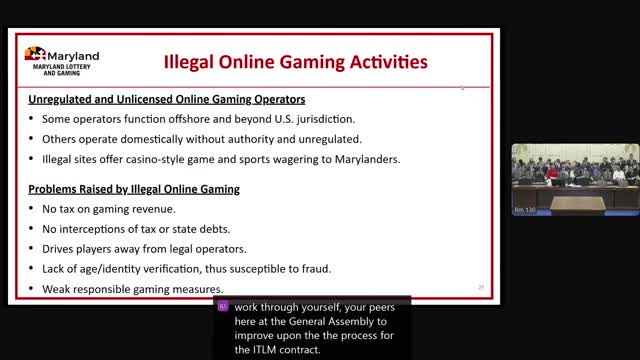Maryland regulators describe offshore 'illegal' online gaming as persistent challenge; cease-and-desist letters ineffective so far
Get AI-powered insights, summaries, and transcripts
Subscribe
Summary
Agency officials told the House Ways and Means Committee that offshore operators offering casino-style games and sports wagering to Maryland residents continue to evade state enforcement; the agency has issued 11 cease-and-desist letters, received six responses and none have agreed to block access.
John Martin, director of the Maryland Lottery and Gaming Control Agency, told the House Ways and Means Committee on Jan. 15 that illegal online gaming operators—primarily offshore sites offering casino-style games and sports wagering—remain an unresolved enforcement problem for the state.
“There's dozens, if not 100, of these entities across the country,” Martin said. “It's almost like, and I apologize for using the term, but the whack a mole concept is something that we use in the industry.” He said the agency had sent 11 cease-and-desist letters and that six recipients had responded to assert their businesses were compliant; none had agreed to block Maryland access.
Lawmakers pressed the agency on where those operators are located and how enforcement proceeds. Martin said most operators are offshore, which complicates service of legal process and prosecution. He described multi-state coordination with about a dozen peer regulators, and said the agency works with the attorney general’s office and other states on iterative legal responses.
Committee members raised the possibility that significant tax increases or regulatory changes could push customers toward illegal operators. Chair Atterberry noted that the governor’s proposed budget included a recommendation to raise the mobile sports-wagering tax from 15% to 30% and a proposed increase in table-game tax rates; Martin said his office would review the governor’s proposal and assess impacts on operators, minority- and women-owned businesses and the legal market.
Lawmakers and the director discussed tools beyond cease-and-desist letters. Martin said payment processors are one enforcement leverage point—credit-card companies and other processors can be asked to identify or block transactions tied to illegal sites—and that some jurisdictions (Michigan was cited by the agency) have taken a stricter approach. He told the committee that many illegal sites accept credit-card payments and that sophisticated cryptocurrency or darknet mechanics are not universally required for these operations.
Delegates asked whether state law provides the agency or the attorney general adequate enforcement tools. Martin said he was not optimistic that additional state-only tools would fully solve the problem because many operators are offshore, and he said he expects some relief would be most effective at the federal level.
Members also raised sweepstakes-style sites and daily-fantasy-sports operators; Martin said sweepstakes are unregulated and can function as a workaround that converts in-game “coins” into monetary value, and that the agency continues to evaluate legal and policy responses.
Lawmakers requested further analysis from the agency about the proposed tax changes and the trafficking of customer payments.
